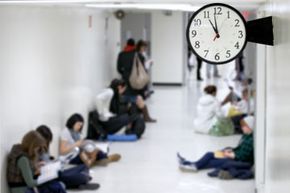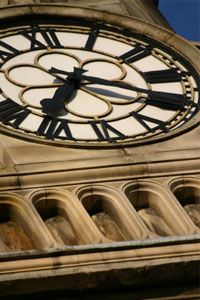Key Takeaways
- The theory that a crowd becomes suddenly silent "20 minutes after the hour" lacks scientific evidence. It might be more of a myth or superstition rather than observable group behavior patterns.
- Physiological and psychological studies suggest that periods of silence within a group could serve as a protective mechanism, reducing stress, blood pressure and cognitive fatigue among individuals, thereby maintaining the overall health of the group.
- While research does not support the idea that crowds experience unanimous silence at specific intervals, there is proof of a need for silence in a noisy atmosphere on a physiological and cognitive health level, indicating that occasional silence could be beneficial in group settings.
It happens all the time: You're talking with a group of people when, with no apparent warning, everyone stops talking. The hush that follows is known, depending on the nature of the conversation, as an awkward silence, dead air or a pregnant pause. But a few people refer to this inexplicable quiet time as the silence of "20 minutes after the hour." They believe that the hush falling over a crowd -- even a large crowd, such as one gathered for a sporting event -- occurs exactly 20 minutes after the hour.
There are many explanations given for this effect, ranging from the completely superstitious to the vaguely scientific. Let's start with the superstitious. One superstition says that any sudden silence at 20 minutes after the hour occurs because angels are singing and all mortal beings, either consciously or unconsciously, stop to listen to the heavenly chorus. Another superstition asserts that crowds fall silent at 20 minutes after the hour as some sort of residual recognition of Abraham Lincoln's death, which occurred at 7:20 on April 15, 1865. There is no proof to support these superstitions, and, if anything, they raise a number of questions. Why do angels sing at exactly 20 minutes after the hour, or, if they are singing all the time, why do we stop to listen once an hour? Why don't we listen all the time? Similarly, why would a silence today be linked to Lincoln's final labored breath? Did the crowd gathered around Lincoln's deathbed fall silent that long-ago spring morning? If so, why would crowds fall silent at 20 minutes after every hour? Why not at exactly 7:20? And why not at 7:20 on April 15?
Advertisement
Others take a more scientific tack to the silence of "20 minutes after the hour." Members of this group offer up the protection postulate, which says that humans lapse into silence so that they can listen for danger in the manner of their prehistoric ancestors. As soon as we're satisfied danger isn't lurking nearby, we resume talking. It's certainly a reasonable notion, bringing to mind Carl Jung's idea of all humanity sharing an unconscious mind that is the product of ancestral experience.
There is no hard evidence to support Jung's collective unconscious, either, but science has revealed some other interesting clues why silence among members of a group just might be golden.
Advertisement




